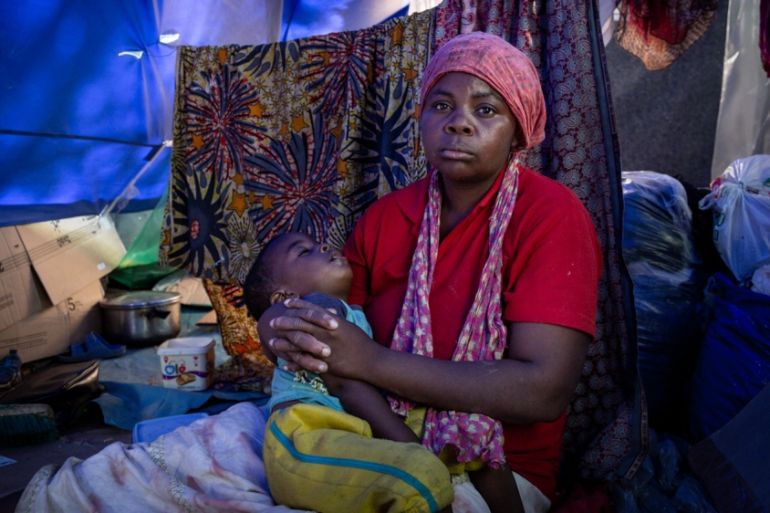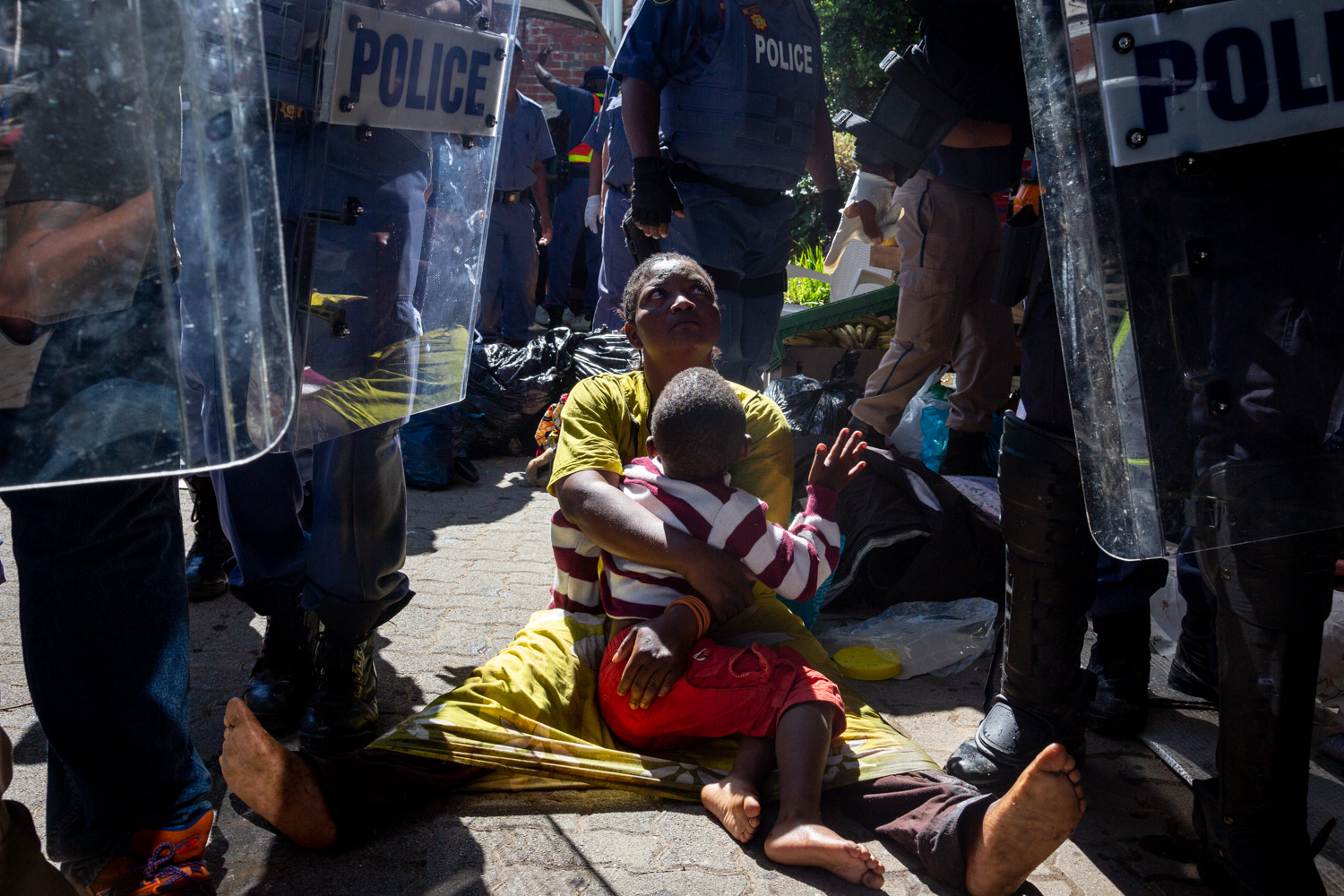Stateless in South Africa: ‘They were setting people alight’
A refugee describes fleeing violence in eastern DRC with her children only to face the fear of more in South Africa.

In the third of a four-part series on South Africa’s stateless children, a woman describes fleeing violence in eastern Democratic Republic of the Congo (DRC) in 2012, only to face discrimination and the fear of xenophobic attacks in South Africa, as well as the struggle to provide care for her undocumented children.
Beatrice Faida, 24: ‘They are killing people, setting people alight‘
Now aged 24, Beatrice Faida fled violence in the DRC with her two small children in tow more than five years ago.
Keep reading
list of 4 itemsUN report charts lethal cost of migration over past decade
Conflict, climate, corruption drive Southeast Asia people trafficking: UN
Bodies of three Rohingya found as Indonesia ends rescue for capsized boat
She is one of many thousands of displaced persons and refugees from across the African continent to have made their way to South Africa in search of safety and a better life. But since she arrived in South Africa, she has found herself embroiled in yet more turmoil.
While undocumented refugees and migrants struggle to get access to schooling, employment and healthcare, they have also endured a rise in xenophobic attacks.
|
|
The most recent spate of violence was triggered in August 2019 by the death of a minibus driver in Pretoria. He was shot, allegedly while attempting to intervene in a drug deal involving Nigerians.
Twelve people died in the resulting protests, as crowds of locals attacked foreigners and looted foreign-owned shops before setting them alight. Riots spread across the country.
In October, hundreds of migrants and refugees camped out in front of the United Nations High Commissioner’s Office for Refugees (UNHCR) in a Pretoria suburb, demanding help and protection from the escalating violence.
By the sixth week of the sit-in, community leaders reported that more than 600 people were camped outside the UN buildings, requesting to be resettled in a country where they would be safe.
In November, the crowd was dispersed by police, and the migrants and refugees evicted from the camp.

Beatrice, who is documented but whose children are not, is one of the refugees who set up camp along with her four small children on the pavement outside the UNHCR building.
She was born in Sange, a village in the conflict-ridden eastern province of Kivu in the DRC.
The DRC has been embroiled in conflict for decades, with millions of people killed and millions more displaced from their homes. Among the dead are Beatrice’s father and, she believes, her brother, who was arrested when she was a child and never heard from again.
She does not know who murdered her father, only that he was taken by armed men on his way home from the shops. He had gone to buy her and her siblings something to eat.
I didn't take any documents. We didn't pack. I just took my children - I put one on my back and the other one I carried. I just left
Beatrice married her husband, a school teacher, when she was 15. She had their first child, a daughter named Shagayo, that same year. She was pregnant with her son, Victoire, when her husband was detained and tortured. She gave birth to her second child certain that her husband was dead. She was alone – a grieving widow with two babies, and not yet 18 years old.
It was a couple of months after the birth of her son when she got word that her husband was alive. He had escaped and was on his way to South Africa, badly injured and traumatised. Soon afterwards, she received a message from him. “He told me he didn’t know how we would meet again, but if we did it would only be by the grace of God,” she explains.
Shortly after that, she learned that the men who had captured her husband were looking for him, and that she might be in danger.
“They were killing people, and there was blood all over,” she recalls.
She decided to run. “I didn’t take any documents. We didn’t pack. I just took my children – I put one on my back and the other one I carried. I just left.”
It was a long walk – 39km – to the town of Uvira. By the time she crossed into Burundi, her legs were swollen from days on the road and the children were dehydrated. With funds raised by local church groups along the way, she managed to travel by bus through Tanzania, Malawi and Zambia, before finally crossing into South Africa at the Beitbridge border post.
From nearby Musina, she travelled to Durban, a coastal town in Kwazulu Natal where one of the country’s only refugee reception centres still operates. Here, she was reunited with her husband. It was 2014, and she had just turned 19.
They would take a human being, and just take a tyre and put it around him and set him alight
Since then, life has been far from easy. At first, the family settled in Durban. But they were frightened by xenophobic violence that broke out nearby in 2015. Beatrice and her family were confined to their small flat, unable to leave for fear of being targeted. She was pregnant with her third child, Honda, at the time, and remembers looking down from the window onto the streets below.
“They were taking people,” her voice cracks and she clears her throat. “They would take a human being, and just take a tyre and put it around him and set him alight.”
“We ran away from our country because of the war. Now we had arrived in South Africa and this is what is happening? They are killing people, setting people alight alive. Is this the way we were going to live? Where are we going to run to now?” Tears roll down her cheeks as she speaks.
Soon after, she saw a man stabbed to death, simply because he was unable to respond in kind after being greeted in one of South Africa’s local languages. The man, she says, had just arrived in the country and was on his way to the Department of Home Affairs.
“The thing that broke my heart was to see how these people didn’t have mercy for foreigners. Back home, when there is a foreigner, we make sure we teach him the language so that he can be part of us. But that is not the case here.”

When her husband’s hair salon was looted, they decided to rebuild their lives in Sunnyside in Pretoria. Last year, however, no longer feeling safe there either, and with her husband in hospital with long-term health issues related to the torture he endured, Beatrice took her four children to the informal camp of refugees and migrants growing outside the UNHCR building in Pretoria for help and protection.
When we meet her, Beatrice cradles her youngest son against her chest under some blue tarpaulin which has been fashioned into a tent. Looking down at two-year-old Mulemera Kalonda, she says this is not the life she wants for her children. In the corner of the dwelling, Malumera’s older siblings huddle around a single page ripped from a colouring book.
Seven-year-old Shagayo Kalonda and her five-year-old brother Victoire were born in the DRC, while four-year-old Honda and Mulemera were born in South Africa. None of the children has any form of documentation. More than a third of the residents of this tented town are children, with the youngest just three weeks old.
Speaking in Swahili, Beatrice frets over Mulemera. He has been sick for days, she explains, looking down to where he lies limp and listless in her arms. His skin is dry and his lips are cracked from a fever. She hopes she is giving him the right medication – she cannot afford a private doctor and says the local clinic will not help them. She has taken to going straight to the pharmacy when she needs help, but this is less than ideal. “I buy some medication without even knowing what kind of medication I am getting. I explain the sickness to the pharmacist so that they can assist me.”
As refugees, we don't want to be here in this country any more
Her eyes fill with tears as she reaches down to touch Mulemera’s face. “If this child dies, what will I do?” She does not understand why her babies must suffer. “There are so many hospitals here in South Africa. So many hospitals and many doctors but they refuse to assist my child.”
She would like the UN to resettle her and her family somewhere where they can be safe, where her children can get healthcare and go to school. It has been a long time since they have had a place to call home.
“That is why I say as refugees, we don’t want to be here in this country any more. South Africa hates us. They don’t love us here. That’s why we must leave.”
Just days after we talked to Beatrice, in November 2019, police cracked down on the group of refugees camping outside the UNHCR building and demolished their makeshift shelters after a court found the settlement to be unlawful.